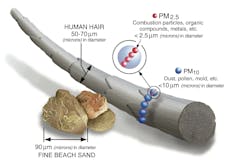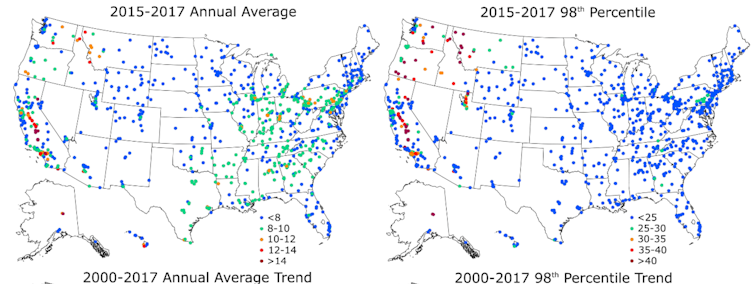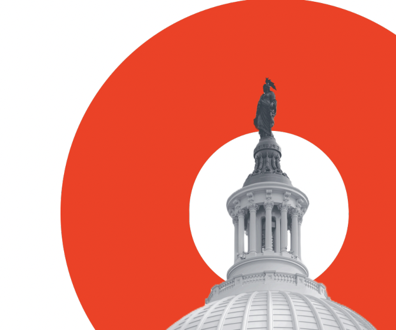
Deliris/Shutterstock.com
Viewpoint: The EPA Disbanded Our Clean Air Science Panel. We Met Anyway – and Found that Particle Pollution Regulations Aren’t Protecting Public Health
Scientists who were appointed to advise the EPA on air pollution kept meeting independently after the agency dissolved their panel. They say current regulations aren't strict enough.
Since 1980, emissions of six common air pollutants have decreased by 67%, thanks largely to government regulation. At the same time, U.S. gross domestic product has increased by 165%. While some assert that regulation acts as a drag on the economy, this record indicates that environmental protection does not have to undercut economic growth.
I have studied air pollution and air quality for over 30 years, and have been directly involved for a decade with the U.S. Environmental Protection Agency’s reviews of scientific findings on air pollution. This includes seven years of service on the agency’s Clean Air Scientific Advisory Committee and stints on 10 specialized panels focused on individual pollutants.
The Clean Air Scientific Advisory Committee is currently reviewing the national standard for regulating particulate matter – tiny solid particles and droplets that measure a fraction of the width of a human hair and penetrate deeply into the lungs when inhaled. Health effects of exposure to fine particulate air pollution include respiratory, cardiovascular and other diseases and premature death.

But on Oct. 10, 2018, I and other scientists on a panel that advised the Clean Air Scientific Advisory Committee on this issue learned that the EPA abruptly disbanded our panel. Now the particulate matter review is moving forward without the scientific expertise and experience that it needs.
To help fill this gap, we reconvened ourselves independently, and have met over the past year to produce scientific advice for EPA aimed at protecting public health. The Union of Concerned Scientists, a nonprofit group that advocates for the use of rigorous, independent science to solve global problems, hosted our most recent meeting on Oct. 10 and Oct. 11, 2019. We reported our conclusions directly to the EPA, and panel members donated their time and expertise.
In contrast, the Clean Air Scientific Advisory Committee has been restructured over the past several years with new appointees who appear to be developing advice aimed at pleasing the EPA administrator.
A serious threat to public health
Fine particle air pollution comes from many sources, including burning fossil fuels. Today more than 20 million Americans live in areas with high levels of fine particles.
Average annual fine particulate levels in the U.S. fell by nearly 25% between 2009 and 2016, but this trend may be reversing. Increasingly frequent and severe wildfires, such as those currently raging in California, are one likely source.
A recent study found that fine particle levels rose 5.5% between 2016 and 2018 and estimated that this increase was associated with some 9,700 premature deaths in 2018 that would not have occurred otherwise. Our panel noted the recent uptick in fine particle levels in our latest report, released last week.

Science-based standards
The Clean Air Act requires the EPA to conduct regular reviews of national air quality standards. The Clean Air Scientific Advisory Committee’s job is to review the “latest scientific knowledge” underpinning regulations for major air pollutants. If the science indicates that existing standards are not adequately protecting public health, the agency must revise them.
The committee has seven members, appointed by the EPA administrator. But air pollution standards draw on many scientific disciplines, including air quality, epidemiology, toxicology, medicine, biostatistics, ecology, climate and risk assessment. For decades, EPA has organized panels of additional experts to help the Clean Air Scientific Advisory Committee review the latest research – until now.
Our nongovernmental panel has multiple experts in epidemiology, toxicology, medicine, exposure assessment, risk assessment, statistics, air quality measurement and modeling. The Clean Air Scientific Advisory Committee doesn’t have an epidemiologist, although epidemiology is a central discipline in analyzing health effects from exposure to fine particle pollution.
In fact, the committee admitted this, and asked the EPA in April 2019 to reinstate our panel. EPA Administrator Andrew Wheeler refused. Instead he appointed a smaller group that is not allowed to deliberate with the Clean Air Scientific Advisory Committee.
Breaking the review process
EPA officials began undermining the scientific review process in 2017, when then-Administrator Scott Pruitt wrote a memorandum that bars scholars who hold EPA research grants from serving on the Clean Air Scientific Advisory Committee. But often these are precisely the highly respected scientific leaders that the committee needs.
The federal government has long recognized that holding a research grant does not infringe on a scientist’s “ability to offer independent scientific advice.” In contrast, Pruitt allowed people who received funding from regulated industries to serve on the Clean Air Scientific Advisory Committee.
On Oct. 10, 2018, Pruitt’s successor, Andrew Wheeler, replaced five Clean Air Scientific Advisory Committee members. The committee now includes one researcher, staff from one federal and four state agencies and an industry consultant. Wheeler has also shortened the science review schedule and dropped key assessment documents from the review.
Ignoring the science
Past Clean Air Scientific Advisory Committee reviews of national air quality standards took three years on average. They focused on three major EPA staff reports that 1) summarized scientific findings on health effects, 2) established the scientific basis for quantifying health risk and 3) identified potential options for retaining, revising or rescinding current standards or setting a new ones. These steps were carefully designed to clearly establish the science before making judgments about policy.
Now, however, the Clean Air Scientific Advisory Committee’s Integrated Science Assessment on particulate air pollution – the first step in the three-stage sequence – is still in draft form, and EPA is introducing policy issues before the science is settled. We expect that the agency will be sued for this and other procedural irregularities.
Our panel met publicly to carry out a scientific review of EPA’s policy assessment. We concluded that existing annual and 24-hour standards for fine particle air pollution are not protective of public health.
Currently, federal regulations set an annual standard of 12 micrograms per cubic meter of air, or ug/m3. We recommend lowering this standard to a range of 8-10 ug/m3. Similarly, we recommend revising the existing 24-hour standard – which applies to short-term pollution spikes – from 35 ug/m3 to 25-30 ug/m3.
These scientific findings are based on consistent epidemiological evidence from multiple studies, at ambient concentrations below the levels of the current standards. The epidemiologic results are supported by results from toxicological and controlled human studies.
In contrast, when the Clean Air Scientific Advisory Committee met on Oct. 24 and Oct. 25, two of its six members supported tightening the relevant standards, but the other four concluded that existing standards are good enough. This view ignores compelling new evidence, including the largest-ever U.S. epidemiologic study for fine particles, published in 2017. This study and others clearly show adverse health effects – including premature death – at exposure levels below current U.S. standards.
We believe the EPA should follow the law, which requires a thorough review of the science underpinning air pollution standards. A first step would be reappointing our panel to provide the Clean Air Scientific Advisory Committee with the expertise on particulate matter that it needs.
This is an updated version of an article originally published on Nov. 26, 2018.
![]()
This post originally appeared at The Conversation. Follow @ConversationUS on Twitter.






